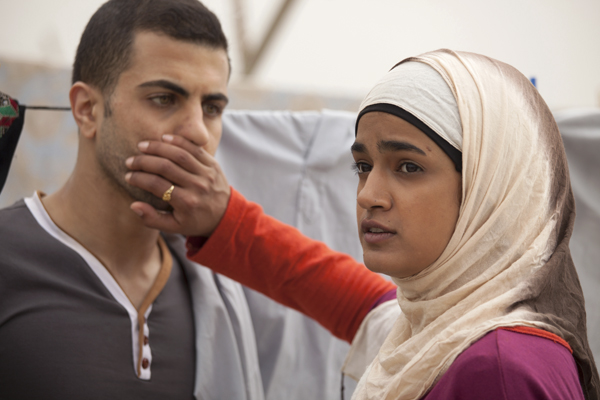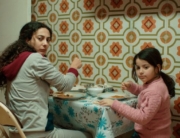Director Elite Zexer’s first feature film offers an unusually complex view of the strains on each member of an Israeli Bedouin family, as they try to follow traditional social obligations and engage in modern life.
In the opening scene, 18-year-old Layla (Lamis Ammar, in a lively debut) is at the wheel of her indulgent father Suliman’s (Hitham Omari) truck. Her wild drive back from college has to end, though, before home comes into sight and normality resumes, in case anyone sees her in the driver’s seat.
Layla arrives to a home in turmoil. Her 42-year-old mother, Jalila (a formidable Ruba Blal-Asfour), is shooing around Layla’s younger sisters in order to stoically prepare the new addition to the house and a wedding reception—all for her husband’s younger, and apparently well-to-do, second wife. She even makes Layla help carry the new bed out of the vehicle and set it up for Suliman and his about-to-be second wife.
Despite the emotional tension, the wedding rituals play out as if this is a joyous occasion for the whole village, with the men line-dancing together and the women singing ululations. Ironically, the bride seems as heavily made up as a corpse. The wedding night is not happy for the first wife—especially when Jalila hears Layla’s cell phone ring and answers it. To her shock, she hears a man she doesn’t know ask for her daughter.
Additionally, Jalila’s husband fondly shares memories with her before he takes his new bride off on a honeymoon. His first wife has to clean up the party, and is left with the generator he didn’t fix, the washing machine that doesn’t work, and the spoiled food in the refrigerator. Yet the clothes will have to be hand-washed (with the hanging laundry spitefully blocking the view of the new wife’s return), and the kids still have to be fed. Jalila mutters curses against her husband, but Layla keeps defending him—and the boyfriend who called her.
After donning a head scarf and taking the bus into town for college, Layla meets up with her worried boyfriend, Anuar (Jalal Masarwa). Rather than the usual Romeo and Juliet coupling of opposite differences, the script takes a different tack; her boyfriend is also a Bedouin, albeit from a different, and therefore forbidden, tribe, though this is not made entirely clear. For his part, Anuar is willing to do the right thing. He wants to tell Layla’s father that he loves her and to ask to marry her. He promises he will see that she continues her education, while Layla agrees to convince her mother about their arrangement.
When her father returns from the honeymoon, he’s summoned to a gathering of the elders. The spooky, one-by-one appearance of these traditionally-robed men, the light catching them in the pitch-black night, captures the feel of a life in this valley before electricity and reinforces the extent to which the community will maintain social control. Layla’s spying younger sister, Tasmin (Khadija Alakel), reports back to Layla that negotiations are underway to marry her off to the bride’s “fat” brother, as Tasmin describes him. (The pressures on the father from the elders aren’t clear—it could be because Layla is of marriageable age or due to the other family’s financial clout or because Suliman only has daughters.)
Each family member’s reaction precipitates a crisis and an unpredictable solution. Confronting her children’s future head-on, Jalila unexpectedly rises as the central force in the family, both for the sake of her younger daughters’ futures and for the film.
Director Zexer spent years accompanying her ethnographic photographer mother to Bedouin villages, such as the four locations in which she filmed, where she involved local women in several years of script development. The details of daily life look intimately realistic, similar to those seen in Ada Ushpiz’s documentary Desert Brides (2008). While free of the villains seen in other films about the consequences of avoiding forced marriages (2014’s Difret from Ethiopia), Sand Storm is moving, but ambiguous plot details presumes a cultural context that’s not always explained.
Sand Storm is Israel’s entry for the foreign language Oscar, after winning six Ophirs, presented by the Israeli Academy of Film and Television, including Best Picture, the first time an Arabic-language film has been selected.







Leave A Comment